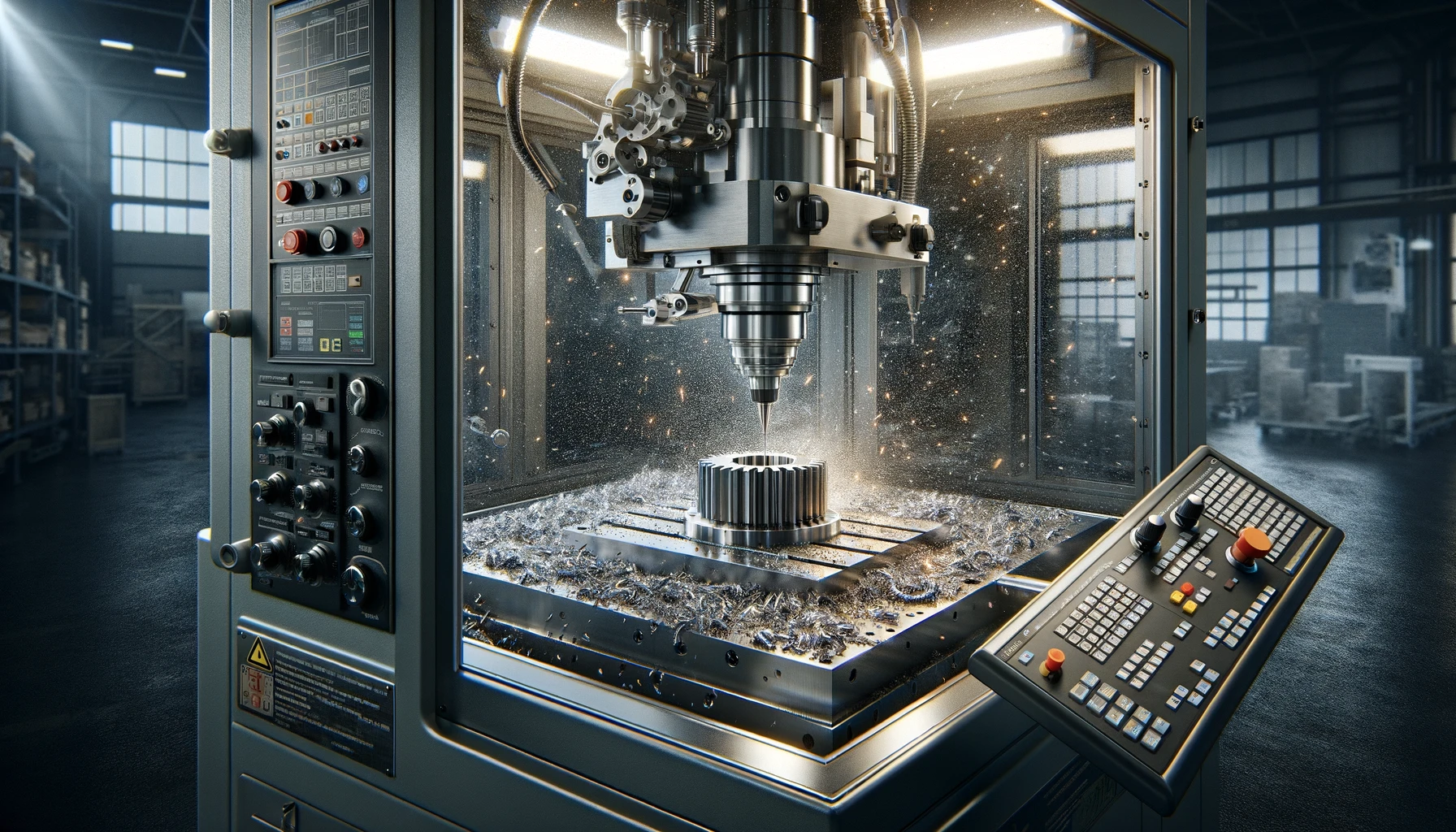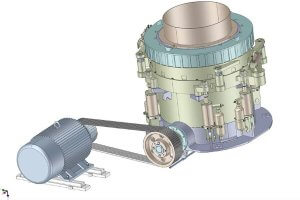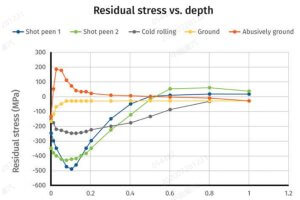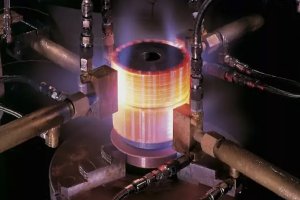Selection of Materials for sprockets in Food Automation Systems
The rapidly evolving field of food automation demands components that combine precision, efficiency, and unwavering adherence to safety standards. CNC machined sprockets, integral to the movement and functionality of food processing equipment, must be manufactured with materials that not only endure the mechanical rigors of operation but also meet stringent health and safety regulations. This article delves into the complexities of selecting the right materials for such components, examining a variety of metals, plastics, and composite materials. Each choice offers distinct advantages and challenges, shaped by factors such as mechanical properties, resistance to harsh environmental conditions, and regulatory compliance. The selection process is critical, involving detailed analysis and understanding of each material’s interaction with food products and cleaning chemicals, ensuring that all components are safe, reliable, and cost-effective.
What Are the Unique Challenges of CNC Machining for Food Automation Systems?
Why is Material Selection Critical in CNC Machining for Food Automation?
Material selection in CNC machining for food automation systems must consider several unique challenges. The chosen materials need to withstand high pressures, constant exposure to a variety of food substances, and aggressive cleaning protocols involving harsh chemicals and high temperatures. Furthermore, these materials must prevent any form of chemical leaching or contamination that could compromise food safety.
- Precision and Fit: The accuracy of CNC machined sprockets ensures they integrate seamlessly into complex assemblies, reducing the risk of food traps where bacteria can proliferate.
- Chemical Resistance: Resistance to acidic or basic food products and cleaning agents is crucial to prevent material degradation and contamination.
- Regulatory Compliance: Materials must comply with local and international safety standards, including FDA regulations for food contact materials.
How Do Material Properties Impact the Performance of Sprockets in Food Automation?
The performance and reliability of sprockets in food automation systems heavily depend on their material properties. Materials must be selected based on their ability to withstand the unique environmental conditions of food processing, including exposure to high temperatures, corrosive substances, and rigorous cleaning protocols.
Crucial Material Properties
- Hardness and Wear Resistance: Essential for durability and the ability to withstand the mechanical wear from continuous operation.
- Corrosion Resistance: Critical for longevity, especially in environments where exposure to acids, salts, and other harsh substances is common.
- Thermal Stability: Important for maintaining structural integrity in processes involving variable or high temperatures.
- Chemical Resistance: Necessary to resist degradation from cleaning chemicals and food ingredients.
- Food Safety Compliance: Materials must not leach harmful chemicals into food, adhering to health and safety standards.
- Ease of Cleaning: Surfaces should be smooth and non-porous to prevent food particle adhesion and facilitate easy cleaning.
Data Table of Material Properties:
| Material | Hardness | Wear Resistance | Corrosion Resistance | Thermal Stability | Chemical Resistance | Food Safety Compliance |
|---|---|---|---|---|---|---|
| 316 Stainless Steel | High | High | Excellent | High | Excellent | Yes |
| 304 Stainless Steel | Moderate | Moderate | Good | Moderate | Good | Yes |
| Titanium Alloy | High | Very High | Excellent | Excellent | Excellent | Yes |
| Aluminum Alloy | Low | Low | Moderate | Moderate | Poor | Conditional |
| PEEK | High | High | Excellent | Excellent | Excellent | Yes |
| UHMW PE | Low | Moderate | Good | Low | Moderate | Yes |
- 316 Stainless Steel is one of the most robust materials available for food processing due to its exceptional resistance to corrosion and chemicals, making it ideal for harsh environments.
- Titanium Alloy stands out with superior hardness and thermal stability, suited for high-temperature applications and environments where mechanical and thermal stresses are significant.
- PEEK (Polyether ether ketone) provides excellent chemical and thermal resistance, along with being compliant with food safety, making it suitable for specialized equipment where plastic materials are preferable due to lower weight or specific chemical exposure.
Understanding the interplay of these properties allows for the informed selection of materials that not only improve the efficiency and safety of food processing operations but also reduce downtime and maintenance costs. The choice of material impacts every aspect of a sprocket’s performance in food automation, from its operational lifespan to its compliance with strict industry regulations.
Stainless Steel: The Optimal Choice for Food-Grade Applications?
Stainless steel is widely acknowledged as the optimal material for food-grade applications due to its superior corrosion resistance, ease of cleaning, and non-reactive surface.
Benefits of Stainless Steel in Food Automation
- Hygiene: The non-porous nature of stainless steel makes it ideal for food contact surfaces, as it does not harbor bacteria or react with foods.
- Durability: Highly resistant to wear and corrosion, stainless steel ensures the longevity of components even under harsh conditions.
- Ease of Maintenance: Smooth stainless steel surfaces can be easily cleaned and sterilized without special treatments.
Data Table:
| Grade | Corrosion Resistance | Typical Applications |
|---|---|---|
| 304 Stainless Steel | Good | General food contact |
| 316 Stainless Steel | Excellent | Harsh environments |
Case Study: A meat processing plant used 316 stainless steel sprockets for their high-moisture, acidic environment, significantly reducing replacement frequency and maintenance costs.
Plastics and Composites: Are They Viable Alternatives to Metals?
In the context of food automation, plastics and composites are considered viable alternatives to metals due to their advantageous properties such as corrosion resistance, lower weight, and compliance with food safety regulations.
Advantages of Plastics and Composites
- Corrosion Resistance: Unlike metals, most plastics and composites do not corrode, which reduces maintenance needs and prolongs the life of components.
- Lower Weight: Facilitates easier handling and reduced energy consumption in mobile parts of machinery.
- Design Flexibility: Can be molded into complex shapes more easily than metals, often at lower costs.
Comparative Data Table:
| Material | Weight | Corrosion Resistance | Cost Effectiveness |
|---|---|---|---|
| UHMW PE | Very Low | Excellent | High |
| Nylon | Low | Good | Medium |
| Stainless Steel | High | Excellent | Low |
Case Study: A beverage bottling facility transitioned from metal to composite conveyor components, resulting in a 30% reduction in motor energy requirements due to the lower weight of the components.
Aluminum Alloys: A Lightweight Option for Food Automation Systems
Aluminum alloys represent a fascinating alternative to heavier metals like stainless steel in the realm of food automation systems. Their primary advantage is the combination of lightweight properties and good corrosion resistance, making them particularly suitable for applications where weight reduction is crucial without compromising the integrity of the machinery.
Properties and Advantages of Aluminum Alloys
Aluminum alloys, such as 6061 and 7075, are known for their excellent strength-to-weight ratio. These alloys are easier to handle and install, which can be particularly beneficial for mobile or modular systems that require frequent reconfiguration. Additionally, aluminum naturally forms a protective oxide coating, enhancing its resistance to corrosion—a critical factor in the harsh environments of food processing where exposure to water and cleaning chemicals is routine.
Comparative Data Table of Aluminum Alloys vs. Other Metals:
| Material | Density (g/cm³) | Tensile Strength (MPa) | Corrosion Resistance | Typical Use |
|---|---|---|---|---|
| Aluminum 6061 | 2.70 | 310 | Good | Frames, non-food contact parts |
| Aluminum 7075 | 2.81 | 572 | Excellent | Structural components requiring high strength |
| Stainless Steel 304 | 8.00 | 505 | Excellent | Food contact surfaces |
Considerations and Limitations
While aluminum alloys offer many benefits, there are considerations that must be addressed. For direct food contact applications, aluminum surfaces need to be treated or coated to prevent any reaction with acidic food substances. Additionally, the mechanical properties of aluminum, such as its lower modulus of elasticity, mean that it may deform under loads where heavier metals like steel would not.
In conclusion, aluminum alloys offer a viable, cost-effective alternative for certain components within food automation systems, particularly where weight reduction is beneficial. However, the decision to use aluminum must consider both the advantages and the specific operational demands of the system to ensure that the integrity and safety of the food processing are not compromised.
How Does Surface Finish Affect the Cleanliness and Maintenance of Sprockets?
The surface finish of CNC machined sprockets plays a critical role in maintaining hygiene and reducing maintenance demands in food automation systems. A proper finish helps prevent the buildup of food particles and bacteria, which is essential for meeting stringent food safety standards.
Importance of Surface Finishing
- Reduction of Microbial Adhesion: Smooth, polished surfaces limit the ability of bacteria and other contaminants to adhere, simplifying cleaning processes.
- Corrosion Resistance: Certain finishes enhance the corrosion resistance of the material, crucial for preventing deterioration due to harsh cleaning chemicals and environmental conditions.
Types of Surface Finishes and Their Effects:
- Electropolishing: Improves corrosion resistance and cleansibility by smoothing the microscopic surface of the metal.
- Anodizing: Provides a hard, protective outer layer that resists scratching and chemical attack, useful for aluminum parts.
- Passivation: Used primarily for stainless steel, increases corrosion resistance by removing iron and other foreign particles from the surface.
Case Study: A food processing plant implemented electropolished stainless steel sprockets in their packaging line. The result was a 50% reduction in cleaning time required during maintenance cycles, significantly increasing operational uptime.
The Role of Coatings in Enhancing Material Properties
How Can Coatings Improve the Performance of CNC Machined Sprockets in Food Automation Systems?
Coatings play an essential role in extending the service life and enhancing the performance of CNC machined sprockets in food automation systems. By providing additional layers of protection, coatings can significantly improve a material’s resistance to wear, corrosion, and contamination—all critical factors in food processing environments.
- Overview of Coating Types: Detailed discussion on various types of coatings such as PTFE (Teflon), ceramic coatings, and anodizing. Each type offers unique benefits, from reducing friction and wear to enhancing corrosion resistance and aesthetic value.
Benefits of Each Coating Type:
| Coating | Wear Resistance | Corrosion Resistance | Application Benefit |
|---|---|---|---|
| PTFE (Teflon) | High | Moderate | Reduces food adhesion |
| Ceramic | Very High | High | Protects in high temperatures |
| Anodized | Moderate | High | Increases surface hardness |
Closing Thoughts: The Importance of Material Selection in Food Automation
Reflecting on the Critical Choices in Material and Technology for CNC Machined Sprockets
As we conclude, it’s evident that the choice of materials and surface treatments for CNC machined sprockets in food automation systems is not merely about achieving operational efficiency. It is about crafting components that can withstand the unique challenges of food processing environments—where safety, cleanliness, and durability are paramount. This article has explored the nuances of various materials such as stainless steel, aluminum alloys, plastics, composites, and the impacts of surface finishes and coatings. Each material and treatment offers distinct advantages and must be carefully chosen based on specific application needs and regulatory requirements.
Other Articles You Might Enjoy
- How Can Precision CNC Machining Improve the Durability and Performance of Sprockets in Food Automation Systems?
What Materials Are Best Suited for CNC Machined Sprockets in Food Automation Systems? Precision CNC Machining can improve the Durability and Performance of Sprockets in Food Automation Systems.When selecting materials…
- What Makes Chinese CNC Machining Ideal for Producing Food Automation Machinery Shafts
Introduction to CNC Machining in China China's prowess in manufacturing has grown significantly, with CNC machining at the forefront of its industrial capabilities. CNC (Computer Numerical Control) machining is a…
- How Does the Use of CNC Machining Parts in Molds Improve the Performance of Food Automation Machinery?
Introduction CNC (Computer Numerical Control) machining has revolutionized the manufacturing world with its precision and versatility, especially in producing complex parts for various industries. In the realm of food automation…









